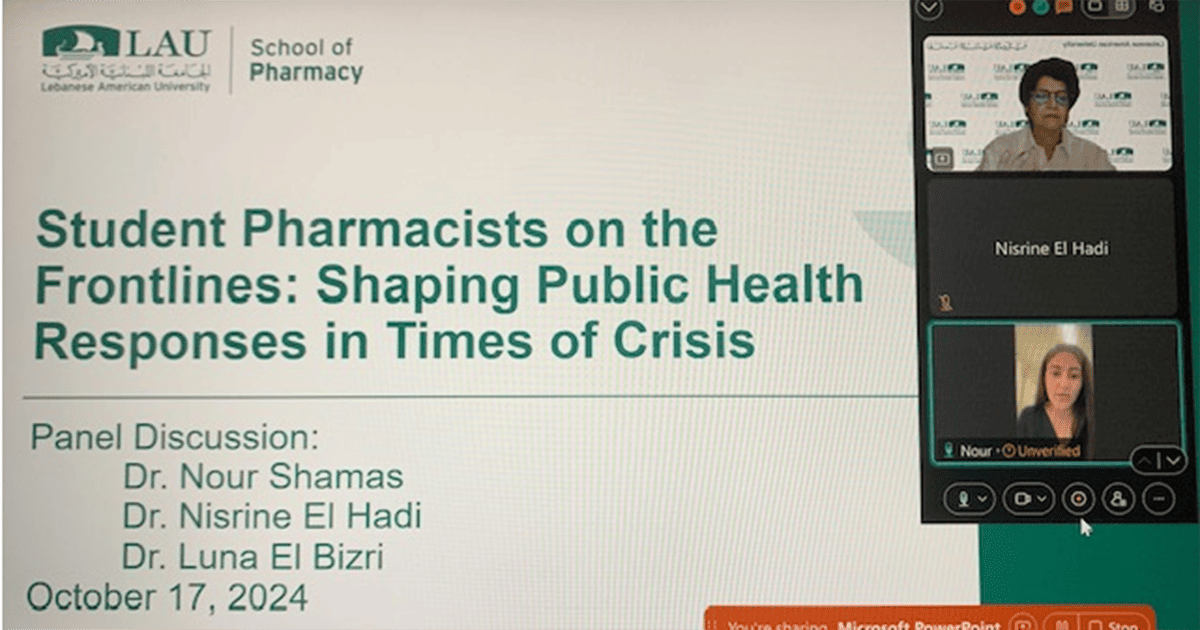Shaping Pharmacists for Public Health Frontlines
The Office of Student Affairs at the School of Pharmacy holds a timely panel discussion on the proactive role pharmacists play in addressing public health emergencies.
Despite the array of challenges facing the country, the LAU School of Pharmacy remains steadfast in its commitment to preparing students for diverse professional demands and environments. In line with this mission, the Office of Student Affairs at the school organized a panel discussion on October 17, titled Student Pharmacists on the Frontlines: Shaping Public Health Responses in Times of Crisis.
The panel, attended by students from all professional years and faculty, and moderated by Dr. Lamis Karaoui, explored the essential role of pharmacists in public health, emphasizing their contributions to crisis management and offering guidelines to address emerging community service challenges. Featured speakers included Dr. Nour Shamas (PharmD ’11), an antimicrobial stewardship consultant for the World Health Organization (WHO) Regional Office for the Eastern Mediterranean; Dr. Nisrine El Hadi (PharmD ’16), Academy Division Manager at the AUB Global Health Institute; and Dr. Luna El Bizri, an executive committee member of the Health and Medicine Information section at the International Pharmaceutical Federation.
According to Dr. Shamas, pharmacists, including student pharmacists, are instrumental in mitigating the impact of antimicrobial resistance (AMR) on public health in humanitarian emergencies. “By volunteering in affected areas,” she said, “pharmacists can engage directly with communities in need, providing in-kind donations of medicines and supplies, counseling on the proper use of medications, and educating the public about communicable diseases and overall health practices.”
She also noted that community service creates new opportunities for pharmacists and helps train them to become better professionals. “Through service, students gain a deeper understanding of their community’s needs, and develop essential skills such as effective communication, empathy and teamwork,” she said, adding that these experiences “cultivate a heightened sense of emergency preparedness and advocacy, equipping future pharmacists to respond to health crises with a well-rounded skill set.”
When asked about ways to safeguard the pharmacist’s mental health during crises, Dr. El Bizri warned that the workload can quickly become overwhelming, especially as they have to manage patients who are frustrated about the lack or shortage of medications. “Patients in distress need us to not only listen to their concerns,” she noted, “but also to proactively seek solutions, whether by arranging for them to better access their medication or by referring them to mental health support services.”
Dr. El Bizri advised the students to balance the dual demands of personal safety and patient care and pointed out that pharmacies could support their teams by reorganizing tasks, adjusting shifts and considering financial incentives to reduce the impact of mental health distress on staff.
“Pharmacists can act as crucial first responders in conflict-affected communities,” stressed Dr. El Hadi. She explained how this can be achieved by pharmacists through sharing information on topics such as mental health, hygiene and immunization, and through providing essential patient-care services including first aid, medication management and mental health support. Pharmacists, she added, can also engage communities through needs assessments and awareness-building sessions, collaborating with NGOs to address urgent health concerns and supporting health systems by assisting with research in disease surveillance, outbreak response and needs assessments.
In response to how pharmacists can proactively prepare for such challenges, Dr. El Hadi emphasized the importance of understanding the socio-political factors driving health crises in the region and studying the work of organizations such as the WHO and Médecins Sans Frontières. “A clear grasp of the context enables pharmacists to work more effectively in humanitarian efforts,” she explained.
Furthermore, she recommended training pharmacists in first aid, trauma care and communication, as well as keeping them informed through professional networks, social media, and courses on epidemic preparedness.
